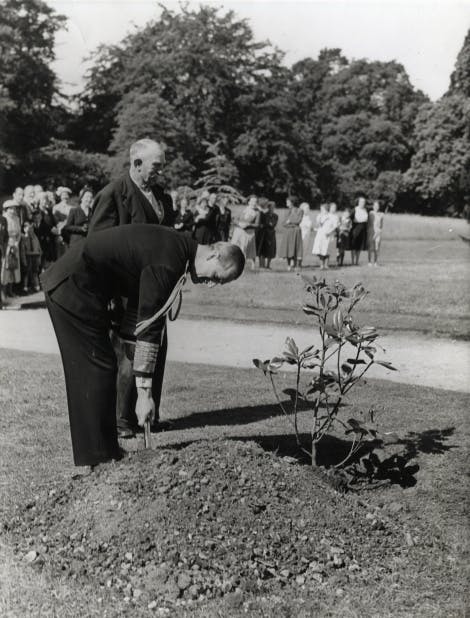Royal Trees at Hillsborough Castle
Date: 31 May 2023
Author:
Claire Woods
Ceremonial Trees planted by the Royal Family
The tradition of planting ceremonial trees at Hillsborough Castle began over 150 years ago, to mark the birth of the infant Earl of Hillsborough in January 1872 when the Pinetum was first established.
Here, Claire Woods, Gardens Manager at Hillsborough Castle and Gardens, reflects on some of the trees planted by members of the Royal Family still available to view in the castle grounds today, and a new addition for 2023.
Since 1872, the Royal Family have planted some 61 trees in the grounds of Hillsborough Castle. The first was planted in 1928 by Princess Mary (Viscountess Lascelles) and the most recent two in 2022 and 2023 by His Majesty King Charles III.
Sometimes on this lawn, visitors can be spotted wandering around and looking puzzled. They are probably searching for a tree which they watched being planted by a dignitary, but which appears to have vanished. A faint circle in the grass shows the place where the ceremonial planting usually takes place.
After the formalities are over, the tree will be moved to different locations around the estate, where they can be identified by a plaque showing the person who planted it, the species of tree, and the date.
To walk around some of these trees is to follow a timeline through history.
Elizabeth II and the Duke of Edinburgh, 1953
Magnolia grandiflora (The Castle)
Dating back to the start of Queen Elizabeth II's reign are two splendid Magnolia grandiflora planted by the Queen and the Duke of Edinburgh on 3 July 1953 during the Coronation tour. They have been placed against the castle walls, which gives them protection and additional warmth. Both are fine specimens of this Magnolia whose massive white blooms appear almost luminous in the autumn.
Image: The Duke of Edinburgh plants one of the magnolias in 1953. Behind him are the ten Hillsborough Castle gardeners with their wives and families, who were invited to see the ceremony by Lady Wakehurst, wife of the Governor of the time. © Belfast Telegraph Archive

The Duchess of Kent and Princess Alexandra, 1954
Magnolia sieboldii (The Castle)
Just below the castle are four Magnolia sieboldii. Two are mature specimens planted on 31 May 1954 by the Duchess of Kent and Princess Alexandra.
Image: Magnolia sieboldii on the south lawn planted in 1954. © Historic Royal Palaces

Elizabeth II and the Duke of Edinburgh, 1991
Erman's Birch, Betula ermanii (The Lake)
Queen Elizabeth II visited Hillsborough 25 times during her lifetime, and planted eight trees here.
In a beautiful setting beside the lake you will find a pair of Erman’s Birch, Betula ermanii, planted by the Queen and the Duke of Edinburgh on 29 June 1991. As trees are always better planted in threes, there is also another to create a pleasing group.
A tree for all seasons, this birch has peeling creamy bark on the trunk, produces catkins in the spring, and has a light canopy of leaves that turn yellow in autumn.
Elizabeth II, 1993
Magnolia campbelli 'Darjeeling'
Each year spring is heralded by the huge pink flowers of the Magnolia campbelli 'Darjeeling' planted by the Queen on 6 November 1993. Propagated through cuttings from a tree growing in the Lloyd Botanic Garden in Darjeeling, India it was introduced and named by Hilliers Nurseries in Winchester.
Elizabeth II, and The Duke and Duchess of Cambridge, 2016
Magnolia sieboldii (The Castle)
Another two Magnolia sieboldii were planted in 2016 – the first by the Duke and Duchess of Cambridge and the final one by Elizabeth II during her final visit to Northern Ireland in June 2016.
King Charles III and Queen Camilla, 2023
Tilia henryana (The Castle)
Following his tree planting as Prince of Wales and patron of The Queen's Green Canopy in 2022, His Majesty the King returned to Hillsborough Castle with Her Majesty Queen Camilla for a Garden Party held in the castle grounds. The King and Queen planted Tilia henryana, commonly known as Henry's lime, to mark their coronation – just as Queen Elizabeth II did in 1953.
Tilia henryana was introduced to the west from China by E. Wilson in 1901. The tree was named for Augustine Henry who was originally from Portglenone in Northern Ireland, who discovered it in 1888. Henry's lime is a deciduous tree growing to 25 m in height, its bark pale grey and fissured. The sea green leaves are heart shaped, 10 cm long, with distinctive fringed margins. The tiny pale, almost white, fragrant flowers appear in clusters of up to 20 in autumn.
Image: His Majesty King Charles III plants a tree at Hillsborough Castle and Gardens on 24 May 2023. Her Majesty Queen Camilla and Claire Woods, Gardens Manager at Hillsborough Castle and Gardens stand nearby. NIO / Presseye

Looking after our ceremonial trees
Our gardening team have hundreds of trees to look after but the ceremonial ones are special. They mark special events and provide a living link between the gardens and the Royal Family.
Great care is taken to ensure they are well nurtured, the tree circles must be precisely cut each year and a generous application of mulch applied to keep them healthy and well fed, ensuring they will be in the gardens for many years to come to tell the story of royal tree planting.
Claire Woods
Gardens Manager, Hillsborough Castle and Gardens
More from our blog

How Bill Clinton helped broker the Northern Ireland Peace Process
26 January 2026
Over the last 70 years, Hillsborough Castle has hosted three US Presidents. But it was the USA's 42nd President, Bill Clinton, who had the greatest influence on Northern Ireland's political destiny.

Hillary Clinton and the 'Vital Voices' of Northern Ireland's women
11 December 2025
Hillary Clinton's speech at Hillsborough Castle in 2023 marked a 30-year relationship with the women of Northern Ireland, which started over tea in South Belfast.


